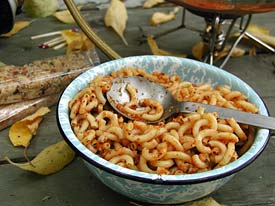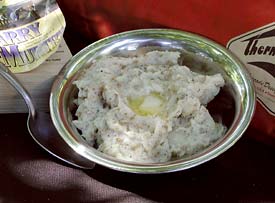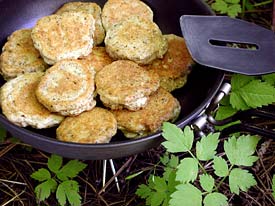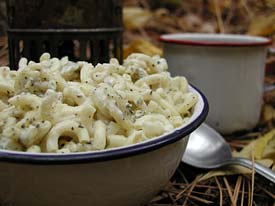 |


|
Years of patrolling backcountry trails and sitting in forest fire lookouts gave Mary Jane Butters plenty of time to think about wilderness — and food. Butters worked as firewatch near Weippe, Idaho, as a wilderness ranger in the Uinta Mountains of Utah and as a guard at the Moose Creek Ranger Station in the Selway-Bitteroot Wilderness.
By the time she switched careers and opened her dehydrated food business in Moscow, Idaho, she had a clear concept of what her product should be: low impact and organic. "When I worked as a wilderness ranger, I was always picking the remains of aluminum packaging out of fire pits," she said. "I swore someday to come up with an alternative." She did. The products were atttractive enough to win the corporate support of Seattle-based Mountain Safety Research, which markets the foods as MSR Mountain Gourmet meals. The concepts were good enough to win an Editor's Choice Award for backpacking food in 2000. This year, again for the first time, Backpacker extended its original Editor's Choice Award to different products within the same product line. They cited 22 MSR Mountain Gourmet foods, including 11 sold in the new aluminum-free, burnable Pouch Cook container. The judges cited "great flavor, healthy ingredients, and simple packaging."
"People can burn my packaging in a hot fire and get rid of it. But personally, I'd still rather see people pack it out," Butters said. The first thing consumers will notice about the food is the cost. It's more expensive than comparable dehydrated or freeze-dried meals primarily because the ingredients are organic. "Wilderness advocates who appreciate the backcountry landscape generally have the same appreciation for farmland, that it shouldn't be sprayed with herbicides and pesticides," Butters said. Providing organic backpacking food has been an uphill battle. "It would be much easier if I didn't insist on organic foods," she said. "But we're over the hump. The food is selling well and is widely available at outdoor retailers, including REI." 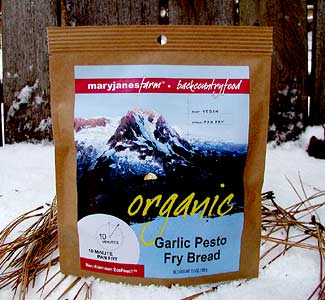
The main change in the new line of pouch-cook meals is the packaging. The pouch can be filled with boiling water to rehydrate the food, and it will stand on its own like a tall bowl. "It's the only stand-up pouch I know of without an aluminum liner," Butters said. The standard line of pastas requires 10 minutes of cooking. The new Pouch-Cook recipes are instant. Just add boiling water. The instant pasta has been pre-cooked, made into flour and reformed into pasta, yet it tastes almost as good as the pasta that requires cooking. "We're the only company in the country with organic pasta," she said, noting that the foods are processed in the Moscow area. Butters' Paradise Farm Organics started in 1989 with basic meals made of peas, lentils and other Palouse grains. The line has expanded dramatically with more than 70 meals or food items ranging from smoked spuds to exotic spiced dinners and nice touches such as instant salsa. The vegetarian line has products to please the vegan crowd. Creative use of spices is a trademark of Mountain Gourmet, although even Butters says some of the offerings will appeal more to one person than to another. "The spicy sesame pasta is very different from other pastas," she said. "It's my least favorite, but my computer guy thinks it's the best. He eats it for lunch here at work."
The bread items are prepared to be "baked" in a covered nonstick skillet as you would make a thick pancake. Devices such as the Outback Oven will cook cakes and breads much like a home oven. But the Mountain Gourmet breads can be cooked in about half the time in a skillet. While the biscuits and corn breads get a thumbs up, the cookies didn't pass The Spokesman-Review's backpacking research team's taste test. "I'd rather just stick a Great Harvest cookie in my pack and save the cooking time," one tester said at a camp near the Selkirk Crest in Idaho. One tester said low cost and high volume are his main criteria for backpacking food as he sliced Costco sausage into a pot with a Lipton rice mix. Mountain Gourmet doesn't necessarily deliver in those two categories. Depending on the product, the food packages say they contain one and a half or two servings. Butters said one serving is just right for her, but two servings barely satisfied a male backpacker in the backcountry taste test. Here's a way to get around hesitation over both the cost and the volume.
The Paradise Farms web site has descriptions of all the products. Especially handy is the price list, which shows how much can be saved by purchasing in bulk. This is the way to go for large orders or group trips. For example, couscous and lentil curry is $3.11 per serving in the Pouch-Cook form, $2.98 in the economy packet and $1.13 in bulk form. The Pouch-Cook is a single serving that needs no extra bowl. The economy packets hold more food and require that you provide the pot or bowl for rehydrating. The bulk foods come in 13- to 15-pound boxes that cost $100 to $300, depending on the product. Buyers use their own packaging, such as reusable zipper-type plastic bags. The REI in Denver has plans to carry the food in bulk, Butters said, but that's not likely to happen soon in smaller markets such as Spokane. "The packages that don't have cheese or butter contain virtually no oil and resist going rancid," she said. "The Oakesdale flour mill uses centrifuge force to explode the wheat berry, so you don't get rancidity for a couple of years." Paradise Farm doesn't keep large inventories of food. "Our foods are always fresh," she said. "We ship to our dealers every week. We're selling real food. We're not trying to put a five-year shelf life on it."
|
